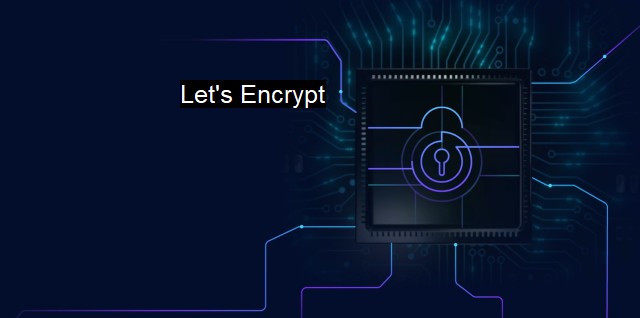What is Let's Encrypt?
Revolutionizing Web Security: Let's Encrypt and the Rise of Free SSL Certificates
Let's Encrypt is a revolutionary innovation in the world of internet security and, more broadly, in the field of cybersecurity and antivirus. This free, automated, and open certificate authority (CA) has been made available by the Internet Security Research Group (ISRG). It is a nonprofit organization that aims to create more secure and privacy-conscious network experiences for users across the globe.The core philosophy of Let's Encrypt is to make encrypted connections in the Worldwide Web ubiquitous. Encryption is the process of encoding information in such a way that only authorised parties can access it. Through its services, Let's Encrypt aims to eliminate the current complex process of manual creation, validation, signing, installation, and renewal of certificates for secure websites.
The role of Certificates in Internet Security is paramount. In simplistic terms, when you visit a website, how do you know it is the website it purports to be? A large part of this 'trust' comes from certificates, which are digital documents that authenticate the website's identity. This trust is mainly determined by Certificate Authorities, who issue, renew, and provide these certificates. In this context enters Let’s Encrypt, which serves as an automated Certificate Authority freeing users from manual toil and giving a major push towards a more secure web.
Pertinent to note that Let's Encrypt has democratized encryption, by reducing the technical and financial barriers once associated with secure certificate installation and maintenance. Its architectural framework, ACME protocol, is designed to make it easy and straightforward for a web server to autonomously obtain a browser-trusted SSL/TLS certificate, avoiding high costs that were a deterrent for small businesses and individual bloggers.
In terms of cybersecurity, encryption is vital in protecting sensitive and confidential data from unauthorized access or breaches. Given the increasing prevalence of cyber-attacks, the encryption of websites and web applications has been a baseline defence within the digital spectrum. Let’s Encrypt can play a significant role in combating online fraud, identity theft, and cryptocurrency mining attacks. The growing reliance on online systems for banking, online shopping, and social media usage invariably means a greater demand for robust cybersecurity systems.
In parallel, the antivirus industry also benefits from the principles of Let's Encrypt. By providing easy access to SSL/TLS certificates, it assures users that their connection with the website server is secure. This promotes user confidence in performing transactions over encrypted connections reducing chances of virus/malware intrusion.
While the use of Let's Encrypt doesn't directly prevent viruses or malware intrusion, it does ensure that sensitive data isn't easily intercepted during transmission. This, in turn, helps in the prevention of attacks that spread malware or steal sensitive data, overriding the chance for any viruses to gain unauthorized access.
Let's Encrypt policy of transparency is another significant factor in the realm of cybersecurity and antivirus. All the certificates it issues, and the process involved are publicly recorded and open, making auditing, scrutiny and surveillance possible.
It should be emphasized that Let's Encrypt only focuses on one aspect of cybersecurity i.e., encryption of data during transmission. It does not cover areas like protection against malware, phishing attacks, DDOS protection, or other advanced threat prevention measures. It is crucial to still utilise antivirus software and other cybersecurity protocols for comprehensive protection against increasing complex cyber-attacks.
Let's Encrypt has monumentally shifted the way security is perceived and handled on the internet. By automating and democratising SSL/TLS certificates, it has made major strides in enabling a safer, more privacy-focused web experience for all. its usage should complement and not replace other cybersecurity measures- it's a part of the solution, not the complete answer, to securing the internet against attackers.

Let's Encrypt FAQs
What is Let's Encrypt?
Let's Encrypt is a free and open certificate authority that provides SSL/TLS certificates for website encryption.Is Let's Encrypt safe and reliable for website security?
Yes, Let's Encrypt is safe and reliable for website security. It uses industry-standard encryption algorithms and follows strict security guidelines to ensure the protection of user data.How can Let's Encrypt help with antivirus protection?
Let's Encrypt doesn't directly provide antivirus protection, but it can help with overall website security by encrypting data transmitted between users and the website, thus making it harder for potential attackers to intercept or steal sensitive information.How can I obtain a Let's Encrypt SSL/TLS certificate for my website?
You can obtain a Let's Encrypt SSL/TLS certificate by using a Let's Encrypt client, which automates and simplifies the certificate request and renewal process. Many web hosting providers also offer built-in support for Let's Encrypt certificates, so you can easily set up encryption for your website.| | A | | | B | | | C | | | D | | | E | | | F | | | G | | | H | | | I | | | J | | | K | | | L | | | M | |
| | N | | | O | | | P | | | Q | | | R | | | S | | | T | | | U | | | V | | | W | | | X | | | Y | | | Z | |
| | 1 | | | 2 | | | 3 | | | 4 | | | 7 | | | 8 | | |||||||